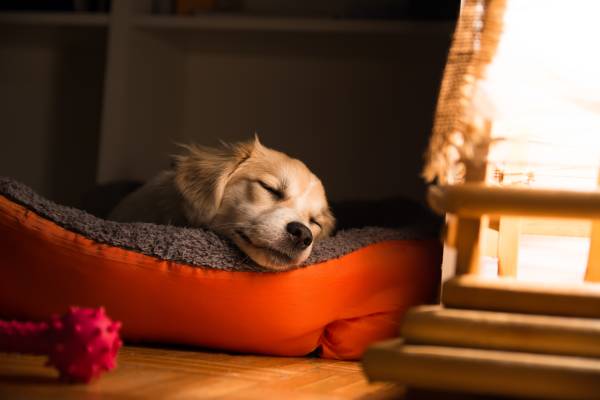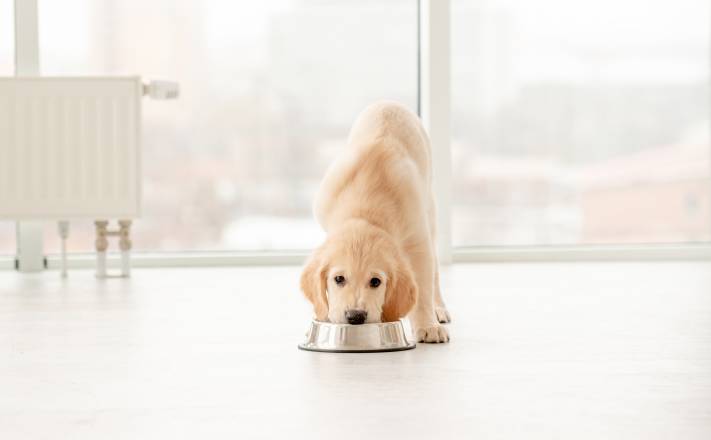Connect with a verified veterinarian in minutes. Licensed vets are available 24/7 to answer your questions. No need to worry about your furry family member.
What a wonderful thing it is to welcome a puppy to your home! There’s nothing better than a sweet bundle of fur to love and play with! What’s better than starting your day out with a puppy at your side?
But what about the night when your puppy’s crying? Could he be afraid of the dark? Does he need some companionship? It’s hard to know exactly what to do if you’re a first-time pet parent. It’s not uncommon for a puppy to have difficulty sleeping his first few nights in his new home.
Think about it from his perspective. He’s just left the only family he’s known—his mother and siblings. He’s also left his first home and come to an entirely new place. He doesn’t really know you or the others in your home. He may also be shy about meeting your other pets. That’s a lot for a little puppy to deal with. No wonder they can have trouble sleeping through the night!
How should you handle it when your puppy can’t sleep? Would a nightlight help? These are the questions we’ll answer in this article!
What Keeps a Puppy Awake at Night?
We’ve already mentioned a couple of major changes that can make your puppy stressed the first few days and weeks. Being away from his mother and littermates for the first time, being in a new place with new people and pets is also stressful.
Puppies may also wake up when they need to go to the bathroom. This can be caused by puppies who haven’t learned to control their bladders yet. In that case, your puppy made needs to have a quick trip outside during the night until his bladder muscles are stronger.
Leaving the Puppy Alone in the Evening
When you first leave your puppy alone in the evening, for a short time, he may become pretty scared. That’s only natural. Puppies can suffer from separation anxiety. In that case, you may come home to a house of shredded shoes, pillows, or even a chewed-up couch!
Puppies can even be afraid of the dark!

Review symptoms, medications & behavior to keep your pets healthy with a Vet Online in just minutes.
Ask a Vet Live NowIs my Puppy Afraid of the Dark?
It’s entirely possible that your puppy is suffering from both separation anxiety and fear of the dark. Those are very challenging for a little puppy to deal with, especially in a new home.
If your puppy does have a fear of the dark, you may notice these symptoms:
- Whining & barking when the lights are off
- Hiding in a space and not wanting to come out (puppies will hide in the smallest place they can find)
- The puppy may become destructive (such as when he’s left alone) at night
- His paws may be hurt from his destructive activities
- He may startle more easily in the dark than during the day
- Nervousness
- Crying, whining when the lights are off
One way to figure out what’s causing these behaviors in your puppy is to test leaving him alone in the evening. You can try two tests:
- Leave your puppy alone, with the lights on
- Leave your puppy alone but turn the lights off
Once you have your puppy and the lights are taken care of, simply leave the house. Go outside and see what happens. Your puppy may not begin to cry or bark right away. Just be patient and see what happens. Take notes when you do both tests and try to figure out why your puppy is having trouble.
If your puppy is more upset when the lights are turned off, then he may really be afraid of the dark.
You may also notice he cries and whines when you turn the lights off and are still home. This may happen when you go to bed, which may be another indication your pup is afraid of the dark.
Should I Leave Light on for My Puppy at Night?
Yes, you can try leaving a light on for your puppy at night. There’s nothing wrong with that. However, the light should be one that’s dim and not too bright. A light that’s too bright could interfere with your puppy’s production of melatonin.
Melatonin is an important hormone that determines your puppy’s (and our own) day and night cycles. If your puppy doesn’t produce enough melatonin, then he may not be able to sleep. Too much light can cause a disruption in the production of melatonin, which is why a dim light is recommended.
Here are some types of lights you can try to help your puppy with his fear of the dark:
Nightlight: may be all it takes to ease your puppy’s fear of the dark. Just place a nightlight near the place your puppy sleeps. This may be his dog bed or crate. There are nightlights that turn off and on automatically. You just set them up on a timer. Or there are nightlights that have sensors built-in. The sensors turn the nightlight on when it becomes dark and turns it off when there’s more light. When using a nightlight, make sure it’s placed where your puppy can’t reach it and chew it up!
Light bulbs with sensors: similar to the nightlights with sensors, you can also find light bulbs that have similar sensors built-in. That way, you don’t have to worry about remembering to turn the light on or off. The sensors will do the work for you.
LED programmable lights: another option is to use LED programmable lights (also called smart light bulbs), which have become popular in recent years. These look like traditional light bulbs but are programmed through an app on your smartphone. Simply tell the lights when to come on and go off. That’s all you have to do!
Light timers: this is a low-tech solution that can also be helpful for puppies afraid of the dark. The timers look like they have a clock on the front, with a plug on the back. The plug simply goes into a power socket. You program the timer when to go off and on; then it does all the work for you!
What If Nothing Helps Your Puppy with His Fear of the Dark?
If you’re not able to find a solution that helps your puppy sleep through the night, then it’s a good idea to see the vet. The vet can determine if there’s an underlying health issue. If not, then they can provide advice and guidance on how to help your puppy get over his fear of the dark.
So, there you have it! We hope this information helps you and your puppy finally get a great night’s sleep!
Connect with a verified veterinarian in minutes. Licensed vets are available 24/7 to answer your questions. No need to worry about your furry family member.

Kyoko
Kyoko is from a family of 3 and moved to New York with her parents and siblings when she was 13. Kyoko is fond of spending a great amount of time with pets, specifically her beagle Luna and cat Missy. Her boyfriend often complains that she spends too much time giving attention to their animals. Kyoko has written dozens of articles concerning pets and is aiming at owning a pet shop one day!
Review symptoms, medications & behavior to keep your pets healthy with a Vet Online in just minutes.
Ask a Vet Live Now




